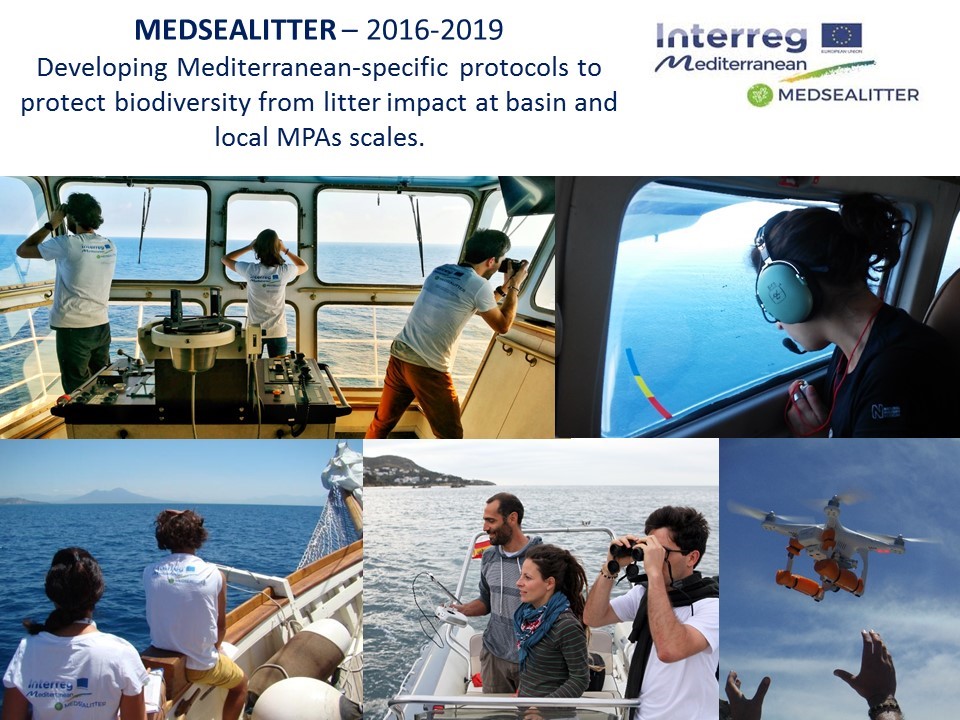The MEDSEALITTER project reaches its final stretch
Started in 2016, this project funded by the INTERREG MED program unites the efforts of universities, research centers, NGOs and marine protected areas in France, Greece, Italy and Spain with the aim of developing standardized protocols for the monitoring of marine litter and of its impacts on marine fauna.
On March 31st, the "TESTING" phase of the project ended, during which the different monitoring techniques of the macro floating garbage and the micro and macro garbage ingested by turtles, fish and invertebrates were implemented in selected areas of the Mediterranean. . This phase has allowed refining the technical details of the common "protocol", which includes specific sub-protocols for each platform and / or research technique used, along with economic / logistic considerations to guide marine areas, or who needs to implement plans of monitoring, towards the choice of the appropriate technique (https://medsealitter.interreg-med.eu/what-we-achieve/deliverable-database/).
Regarding the monitoring of macro floating marine debris, the project proposes the use of opportunistic platforms such as commercial and passenger ships or of light aircraft with observers, for large-scale investigations. On a small scale, the protocol focuses on the use of small or medium-sized vessels, such as zodiacs, sailboats, or small motor boats. The research group of Grandes Vertebrados Marinos (GVM) of the University of Barcelona, on the other hand, has focused on the development of aerial photography techniques for the automated detection of floating waste. In the framework of the project, experiments have been carried out with RGB, thermal and multi-spectral sensors, mounted on drones of various types and small planes. Some 14,000 images, taken in the marine protected areas of the Delta de l'Ebro and the Cap de Creus, and in unprotected areas along the Catalan and Valencian coast, have been analyzed to detect floating debris and marine fauna. In addition, the analysis of the characteristics of the images, in collaboration with the Institute of Earth Sciences Jaume Almera (ICTJA-CSIC) and the research group of Biostatistics and Bioinformatics of the UB, has made it possible to move towards the set-up of algorithms for the automated detection of floating objects in the sea.
Regarding the analysis of ingestion of marine litter, the protocol describes techniques of analysis of macro residues in the gastrointestinal tract of the loggerhead turtle (Caretta caretta), and of micro residues in the stomach of fish such as the boga (Boops boops) and marine invertebrates of the genus polychaeta. The research group GVM of the UB has analyzed bogas from areas subject to different levels of protection along the Catalan coast, highlighting a greater presence of micro plastics in urbanized areas with respect to protected areas. In addition, in collaboration with researchers from IDAEA-CSIC, the analysis of plasticizing substances in these samples has been carried out.
Thanks to a productive collaboration at European level, the MEDSEALITTER protocol has been included by the Technical Subgroup on Marine Litter of the EU (TG ML) in the revision of the official guide for the monitoring of marine litter in European seas ("Guidance on Monitoring of Marine Litter in European Seas ", 2019).
During the last months of the project, the "TRANSFERRING" phase will take place, which includes the presentation of the protocol to marine protected areas and several stakeholders, and training sessions on the technical aspects of the implementation of the protocol. The calendar for the coming months is rich with events in the four countries involved in the project.
In Spain, the training meeting will take place on May 9 at the castle of Denia.
And, in mid-June, in Rome, the final conference of the MEDSEALITTER project will be open to all groups and organizations interested in marine litter at the international level.
For more information:
https://medsealitter.interreg-med.eu/
